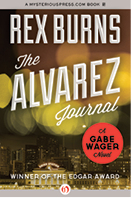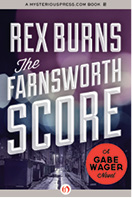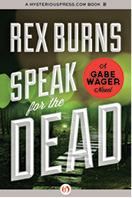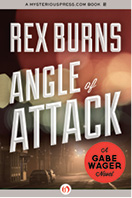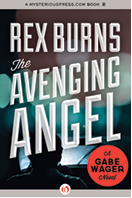Angle of Attack (35 page)
Authors: Rex Burns

“You didn’t outline the body with chalk?”
Even in the dim light of the unshaded ceiling bulb, Wager could see Yates’s sallow neck turn red with embarrassment. “Where the hell would I get chalk? I took pictures, is what I did. You seen the pictures, didn’t you? That shows you where the body was.”
You couldn’t measure distances from a picture; you couldn’t get as clear an idea of the body’s position, either. But Wager nodded silently and stepped carefully to a location that might have been where the killer stood when he fired into the man’s head. Given the narrow alleys between boxes and piles, there weren’t many other places the gunman could have stood. In one of the railroad ties, near eye level, three or four gouges showed freshly splintered wood. “Is that where you looked for the slug?”
Yates said yes. “I stood right where you’re standing, Gabe—I figure that’s where the killer stood. And then I went and dug into every hole in that wall. I even used a metal detector on the floor and along the chinks. But all I found were nails and screws and such.”
He expected Wager to tell him he did the right thing. “That was the right thing to do.”
“Well I didn’t need chalk for something like that.”
“But the slug should still be here somewhere.”
“I looked. Sheriff Tice looked. Even the coroner. Every crack in the logs, floor, even the roof. The only thing we can figure is it angled off Mueller’s skull and out that window.” He pointed to the small hinged square of panes. “It was open. I had to close it to keep varmints out.”
Wager eyed the screenless window from where he stood. It was a possibility—faint, but possible. If the killer had stood over by the stove, the possibility was more likely, but the location of the body wasn’t quite right for that. And the coroner’s report said the body had not been moved.
“Did you go over the place for fingerprints?” Wager lifted the cover on the Indian Head pad to reveal a penciled scrawl of numbers and a painfully totaled column reading $24,974.00, heavily underlined twice.
“Yep. But the only good ones found was Mueller’s. The front door was messed up—everybody coming in the place put their hand to the latch.” He watched Wager scan the tablet. “That make any sense to you?”
“Just numbers. Income, payment, who knows?” He looked around the jumble of the room. “You found no other recent documents? Nothing to show what he was figuring on?”
“Only that angel drawing.”
Wager nodded.
“You want to look around outside?”
He followed Yates back into a sunshine which, after the dimness of the cabin, needled the eyes with glare. A worn path led around the corner to an outhouse that tilted forward enough to hang the slatted door open to reveal its empty bench. A black Dodge pickup, 1950s vintage, sat at the end of two well-worn ruts beside the cabin. A large spread of oil-soaked earth showed where Mueller habitually worked on the rusted truck.
“You couldn’t find any tire impressions or footprints?”
“It’d rained.”
“You have any guesses why he was shot?”
“Just that drawing. Mueller didn’t have a damn thing anybody’d want. You can’t graze a goat on most of his acreage, and the timber’s not worth that much either. Nobody figures he had any money to hide, and he wasn’t tortured or nothing, like somebody was trying to make him talk. Besides, the place looked just like it does now— it’s a mess, but it’s not tore up like somebody was looking for something. I’ve tried and I’ve tried, Gabe, but all I come up with is that angel.”
And Wager had seen enough.
On the way back to Loma Vista Wager finally asked, “What can you tell me about the avenging angels?”
Yates concentrated on the highway’s snaking, downhill curves. “Mister, you might laugh. I know Sheriff Tice does. But I believe in them.”
“Why?”
“Because most of the people around here believe in them. If they believe, by God, so do I.”
He tried to follow the deputy’s reasoning. “Suppose they believe in Bigfoot or flying saucers?”
Yates’s yellow-brown eyes slanted his way. “I’d have to go along with them, Gabe. I mean, look, I been here almost ten years; same northern half of the county, same roads, same patrols, damn near the same pay. But every day I find out something new about the people around here. We got folks living back in the hills or over on that benchland that’ve been here since Christ wore diapers. Some of them don’t even send their kids to school because they don’t want nothing to do with the state. Others I just know about from the county tax rolls, and they never call on the law or anybody else for a damn thing. If they get into a hassle they settle it themselves and nobody comes running to me about it.” He braked slightly and glided around a fishhook bend. “And I don’t go out bothering them if there’s no call to. I guess what I’m trying to say is that things go on around here that I never see and a lot of times never even hear of. And some of the families that have been in these hills since before Colorado was a state were on the side of, or fought against, the avenging angels when the Mormons moved in here. They’re the ones that act like the angels are real. Some of them are scared shitless, I swear.”
It still sounded like a lot of crap to Wager. “Tice said he found no connection at all between Mueller and any Mormon group.”
“That’s right. I never heard of any either. But like I say, Gabe: there’s a hell of a lot about these people that I plain don’t know. And just because I don’t know something, I’m not about to say it’s impossible.”
They rode in silence until the deputy turned the Jeep onto a paved county road leading into a narrow valley. “I’ll run you through Rio Piedra—it’s not too far out of the way. You might as well get the fifty-cent tour.”
The valley twisted close to a stream that foamed whitely until the walls of pine and aspen opened; then it stilled into dark pools behind weathered beaver dams. Wide, shallow pools like these used to be Wager’s favorite fishing spots, and he half wished he had brought the rod and reel and tackle box that were gathering dust in his apartment closet. He remembered how the trout could be seen as dark, hovering shadows halfway across a pond, and how you had to keep low and move gently to get close enough for a cautious flick of the light line, a gentle touch of the fly on the still surface.
“We get good fishing along here earlier in the spring. Fish and Game stocks this area. By now the tourists have about cleaned it out; it’s too close to the road and all.”
“I see.”
The valley began to widen, and up ahead Wager spotted a road sign with two nameplates on one pole,
RIO PIEDRA
. Among the trees a handful of buildings made up the town: a worn gas station whose rusty pumps stuck out of a muddy drive like tree stumps, a windowless board building converted from a storage shed to a cafe with a pink Coors sign hanging on the closed door, some log cabins black with time and dampness that, except for wood-smoke, looked abandoned. Dirt roads led off to either side toward more thin trails and half-hidden cabins.
“My hometown,” said Yates. “Actually I got an A-frame up on the side of the mountain there—gets a lot more sun than down here.” He waved a hand at the shaggy mountain flank that still caught the lowering glow.
“How in hell do these people make a living?”
“Some work for the county—road crews, school-bus drivers. Some of them take in each other’s wash, I guess. And we got some goddamn hippies that live off food stamps and rich parents. A couple of them are okay, but most ain’t worth a damn.” He pointed to the shadowed mountainside, where tongues of broken rock spilled down the slopes, and sagging mine buildings crumbled slowly. “Used to be a pretty big place in the 1890s—ten, twenty thousand people working the mines and services. Some of these people were born here and never left. God alone knows why.”
To Wager, the remnants of the town were more lonely than the empty forest surrounding it. There, in the sprawling national forest, you expected isolation; and anyone found there was a transient fragment of humanity, with ties to someplace else where there were people. But here, the pitted stone foundations poked like rotted teeth above the weeds, and the time-stained cabins that remained were like stray seeds that cling to the poorest soil simply because that’s where chance dropped them and they took hold. “You like living here?”
“Tell you the truth, Gabe, I’d a hell of a lot rather be down in Loma Vista. Me and the wife both. But here’s where I’m stationed, and God knows the rent’s cheap. Besides, it ain’t as empty as it looks—there’s maybe eighty, a hundred people in all, counting the ones back in the woods.” Yates swung the vehicle roughly across a stony lot and headed back down the valley. “And this place might come back again, too.”
“You mean the mines?”
“No, I think they’re pretty much played out. They’re mostly silver, anyway, and the price isn’t that high. No, I mean oil shale—they found oil shale not too far away on the benchland, and this is the closest town if they ever start to develop it.”
“Any Mormons around here?”
“They’re mostly over the pass on the desert side. I don’t know, there may be a few in this valley. No Mormon stake house, though. That’s what they call their meetinghouse. No church of any kind, as a matter of fact.” The deputy pushed the vehicle through the gears. “Let me get you back to Loma Vista before dark.”
All rights reserved under International and Pan-American Copyright Conventions. By payment of the required fees, you have been granted the non-exclusive, non-transferable right to access and read the text of this ebook onscreen. No part of this text may be reproduced, transmitted, downloaded, decompiled, reverse engineered, or stored in or introduced into any information storage and retrieval system, in any form or by any means, whether electronic or mechanical, now known or hereinafter invented, without the express written permission of the publisher.
This is a work of fiction. Names, characters, places, and incidents either are the product of the author’s imagination or are used fictitiously. Any resemblance to actual persons, living or dead, businesses, companies, events, or locales is entirely coincidental.
copyright © 1979 by Rex Raoul Stephen Sehler Burns
cover design by Michel Vrana
978-1-4532-4791-4
This edition published in 2012 by MysteriousPress.com/Open Road Integrated Media
180 Varick Street
New York, NY 10014


FROM MYSTERIOUSPRESS.COM
AND OPEN ROAD MEDIA
